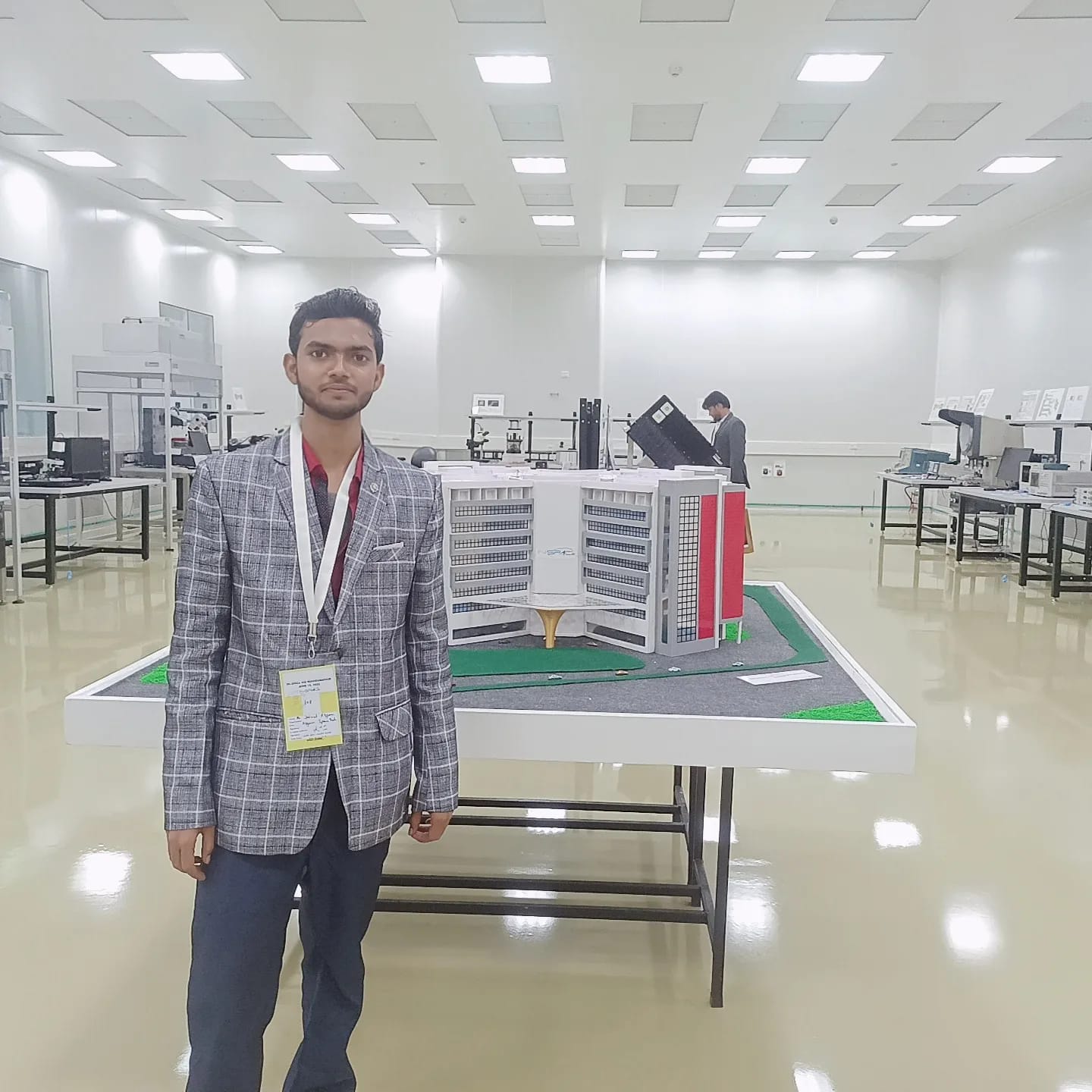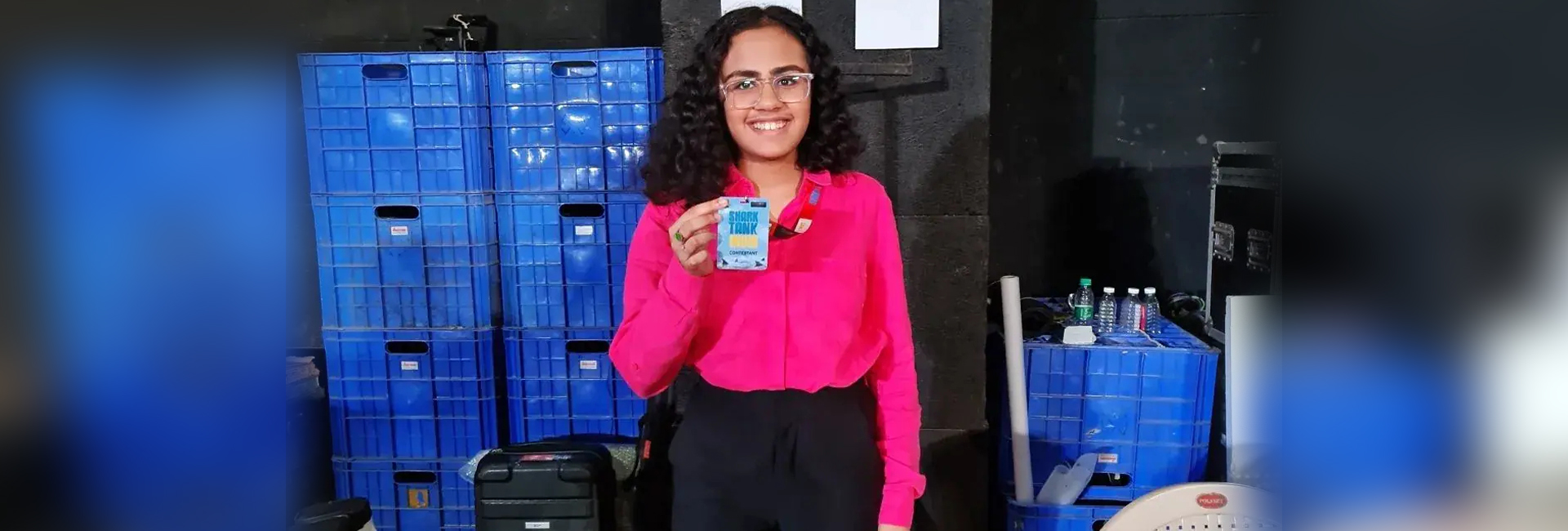(December 9, 2022) Jainul Abedin’s name is similar to that of a great Indian icon – the late Avul Pakir Jainulabdeen Abdul Kalam, or A P J Abdul Kalam, the former president of India and aerospace scientist who worked for DRDO and ISRO. In fact, Jainul was so fascinated by this similarity growing up that he developed a deep interest in rocket science and spacetech.
In 2020, Jainul went on to establish Abyom Spacetech and Defence as a 19-year-old, during the year of his Bachelor’s degree in Physics. His vision was to build reusable rockets to prevent space debris and save operational costs. It has been working on developing ‘reignition liquid engine’ to make this possible.

Jainul Abedin at Department Of Space, ISRO Ahmedabad
“Blue Origin and SpaceX are the only companies in the world that not only enable the launch of the rockets but also their landing back to earth,” he tells Global Indian. There is no such organisation in India. Jainul emphasises this, saying, “India has been launching rockets since the 196Os but we are still using conventional rockets. These are single-use rockets as they cannot re-land on earth.”
Abyom Spacetech and the uniqueness of the idea driving it has brought Jainul recognition on coveted spacetech and aviation platforms like ISRO, IISF, DST, Aero India, and Toycathon. The innovator was also felicitated by Yogi Adityanath, the CM of Uttar Pradesh, for being the only spacetech entrepreneur in the state.
Game changing idea
Rockets become ‘unusable’ after the launch. But if there are reusable launch vehicles, they can be used later in other missions. Another benefit is of cost efficiency. With reusable rockets, the cost of space missions would reduce as space agencies would not be required to build a new rocket every time.
Apart from reducing the accumulation of rocket waste in space, ‘it can make space tourism viable for common people’. That’s a goal Jainul holds close to his heart. “We are not just working in the realm of launching the satellite into orbit but also working on space applications to help sectors like agriculture, meteorology and telecommunications become more efficient through the use of these space apps,” he says.
Abyom Spacetech and Defence has managed to get a few government grants through schemes like the Startup India seed fund. His startup is not only the first aerospace startup from Uttar Pradesh but the only one in the country working towards building reusable rockets.
Early start
The Uttar Pradesh boy had made up his mind to become an entrepreneur in the spacetech segment by the time he passed high school. “My urge to learn about space science was so strong that I went through every bit of learning material that I could access on the subject, whether it was books or information available on the internet.”
Coming from a lower middle-class background, he did not have funds to give wings to his dream. This is where social media played a crucial role. He started building connections with people who had similar interest or background in aerospace and rocket science. Today some of the top executives in his startup including the CTO are people with whom he connected on social media during the ideation phase.
On the Rocket Boy's birth anniversary, we are remembering & honoring the great Dr. Vikram Ambalal Sarabhai,the father of the Indian Space Program.
We're happy to announce that @AbyomSpaceTech has officially signed an MoU with @isro.
Let's continue the efforts together.#ABYOM pic.twitter.com/HIT9GhlCZQ
— Abyom SpaceTech & Defence (@AbyomSpaceTech) August 12, 2022
To generate revenue for the startup, Jainul and his team entered the edtech market. There, they went on to educate some 2500 people in rocket technology and used the revenue they earned to work on their vision. “Since I am from a lower middle-class family, I studied rigorously to do well in academics.” This hard work paid off when Jainul managed government scholarships at different stages of his education. “I used that money as well in building the startup,” he says.
In 2020 Government of India opened the spacetech sector for private organisations. Across India, four innovators got selected to present their ideas to ISRO scientists.” Jainul was one of the four.
Since the pandemic was in full swing during that time, Jainul was invited to a virtual conference organised by the ISRO headquarters, to speak on ‘Developing India’s potential in the space sector’ along with the other three winners. “I was fortunate enough to discuss the ongoing problems in India’s space industry on such a big platform,” says the entrepreneur, whose startup operates from the BITS Pilani campus in Hyderabad.
Making a mark
He has come a long way in just two years. ABYOM SpaceTech and Defence is supported by MCA, INSPACe, ISRO, BITS Pilani, I-hub, StartinUP, DPIIT, and Government of India.
Born and raised in UP’s Kushinagar, and briefly in Kolkata, the youngster finished high school and earned his Bachelor’s degree in Physics from Gorakhpur. Currently, he’s a master’s student at DDU Gorakhpur University.
“The entrepreneurial journey is a bundle of challenges and without resources or backing, it wasn’t easy at first,” he says. The innovator, who comes from a community of farmers, has seen many rejections already on his journey to find funding and technical support. “Wherever I went to pitch my idea, people did not believe that someone as young as me was trying to work on finding a solution to such a technical and challenging problem.”
He found recognition through a government scheme and has since been part of more than 45 national and international webinars, sessions, and conferences to brainstorm on problems faced in the field of aerospace. He has some published research papers to his credit.
Though the 21-year-old has managed to turn many heads already, earning both grants and recognition, he wants to further scale up his startup and diversify into other commercial products in the field of aeronautics and defence. “Abyom requires more funding and I am trying to get it from private players this time,” he signs off.




